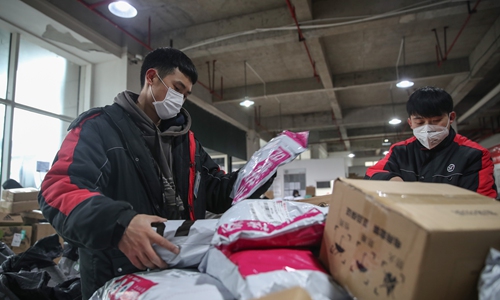Deliverymen nominated for award for contributions amid COVID-19 outbreak
By Wan Lin Source:Globaltimes.cn Published: 2020/4/22 2:11:35

Two SF Express employees sort packages in an SF warehouse in Guiyang, Southwest China’s Guizhou Province, on February 8. Photo: cnsphotos
Two deliverymen and one delivery group were nominated for a China Youth Award on Monday for their outstanding contributions to the fight against COVID-19 in China.
According to the nomination by the State Post Bureau, the delivery people worked around the clock, risking their lives, to ensure a sufficient supply of food, water, and other necessities for residents confined at home during the peak of the outbreak and also provided substantial help to frontline medical workers with transportation and supplies.
Those nominated represent millions of people who work in the courier industry and served as the lifeblood of the country to keep the whole nation running amid the outbreak, observers said.
When everything was at a standstill, the deliverymen became the bridge connecting people and goods, demand and supply, Yao Zhiyong, a professor at the school of management of Fudan University, told the Global Times on Tuesday.
"They are the unsung heroes," said Zhang Xin, a 35-year-old mother of a two-year-old who lives in Jinan, East China's Shandong Province.
Zhang noted that she ordered everything online from hair shampoo to daily food since the outbreak confined everyone at home and got deliveries almost three times a week.
"Online shopping was the only way for us to get fresh milk, fruit and vegetables at the time and I cannot express how much I appreciate these deliverymen," she said.
Chen Yadong, a Beijing-based deliveryman, told the Global Times that the feeling of being needed is special.
He noted there were more people who said, "thanks for your hard work" to him since the outbreak than ever before, which made him more determined to keep doing his job.
Delivery people overcame the heavy workload and the risks of getting infected amid the COVID-19 epidemic in China.
"Many of my colleagues were not able to come back from their hometowns due to the lockdown, so we were facing a big labor shortage in the days after the Spring Festival," Chen said, noting that he worked almost 12 hours and dealt with 200 delivery items per day in February, when the situation was at its worst.
As residential communities do not allow deliverymen to enter communities to leave packages at doors or in lockers, they have to wait outside for people to pick up, which takes longer. With large numbers of packages and a slower delivery process, Chen and his peers rushed from one community to another.
"My hands got frozen cold when loading and unloading the delivery items, especially when people ordered necessities that were large and heavy, such as rice, flour, cooking oil and bundles of bottled water," he said.
Besides work pressure, they were also worried about the infection risk because they had to contact strangers and touch articles that were not disinfected, Chen noted.
The 25-year-old said his family called him almost every day to ensure he was fine. "We were the only group who ran around the city all day when all others were staying at home away from the virus."
Many places in China have started allowing deliverymen to enter residential communities, such as Beijing and Central China's Henan Province, which made the announcement on Monday.
"The spring has finally come, but I will always remember the winter of 2020," said Chen.
Posted in: SOCIETY